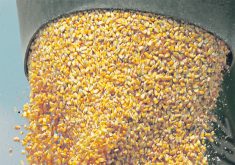It’s been one of the world’s dominant wheat exporters, but Argentina is turning its back on wheat.
An Argentine consultant believes that trend will continue as farmers move into another crop that Canada exports: malting barley.
“Malting barley is an even better crop to join with soybeans than wheat,” said Daniel Miro, president of Novitas, speaking in an interview during the Canadian Wheat Board’s Grain World conference.
Wheat is now grown only as the cold season flip side of much more popular soybeans, which have become Argentina’s most prized crop. Farmers there can grow two crops per year, and a cereal such as wheat works well in a rotation after soybeans.
Read Also

Chinese, Indian tariffs take toll on pea prices
The disruption of pea exports from Canada’s largest customers will likely result in slow pea exports for the remainder of the crop year.
But recently, farmers have discovered that new malting barley varieties give them better returns than wheat and acreage is shifting. Argentina now sells almost all of its malting barley to neighbour Brazil, but if acreage keeps growing, it will look to other countries.
Miro said this includes Colombia, which has traditionally imported malting barley from Canada.
“We’ll probably look at other markets too,” said Miro.
Major brewers have developed higher yielding varieties of malting barley and made them available for farmers, so wheat acreage is threatened.
Miro said European Union and United States crop subsidies made wheat returns poor. Soybean meal exports to the EU have made good money for Argentina’s farmers, so their focus is on improving soybean production rather than wheat.
Some high yielding French winter wheat varieties are being blended into Argentine varieties, but this has caused some quality problems, Miro said. Wheat is becoming less attractive to Argentine farmers, Miro said.
The South American country is blessed by having its farmland near the ocean, so it does not need the long and complex transportation systems that most other wheat exporters rely upon.
But he said more roads and railways are needed, and the country does not have a good investment climate.
Export taxes and other disincentives for crop production have led to underinvestment in Argentine agriculture, and Miro doesn’t see that changing soon.
“Argentina is a very competitive country naturally,” said Miro.
“When we have periods of reasonable politics and economic conditions, then we can express that capacity, but there have been periods where we didn’t have that reasonable environment, and that has damaged our capacity.”
A financial crisis five years ago sent the country into a tailspin, and that is still hurting its prospects, he said.
“The country had a blow, something like a heart attack, in 2001. It’s not a simple problem … . I don’t believe the government we have today is doing the best to reorder what has been disorder,” said Miro.
Argentina has a history of crippling its development with bad policies, and that is happening again, he said. Every time the agricultural economy appears to be developing, the government imposes policies and laws that hobble its growth.
“It’s like (Jason) in Friday the 13th (movies),” said Miro.
“You believe that he’s dead, but he always recovers and kills you. That’s the way the Argentina agriculture system works.”















